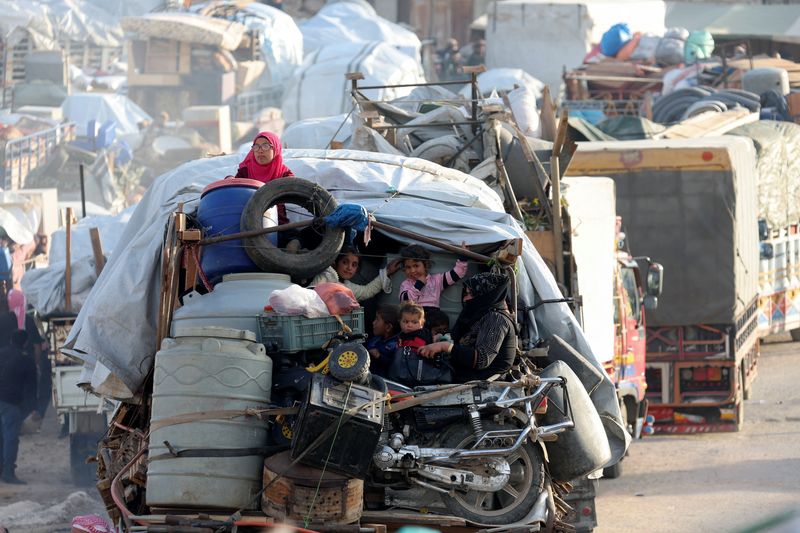By Mohammad Azakir
ARSAL, Lebanon (Reuters) -Hundreds of Syrian refugees returned home from Lebanon on Wednesday, the first day of repatriations organised by Beirut, their mood more subdued than celebratory amid concerns over a scheme that rights groups say may involve elements of coercion.
Lugging suitcases, power generators, fridges and even chickens and mostly skirting around watching media, some 700 Syrians who had agreed to cross over gathered from early morning in a desolate northeastern border zone.
Lebanese authorities say the repatriations, under a revived programme coordinated by General Security, the agency responsible for safeguarding its borders, are voluntary.
But while frontlines in Syria's 11-year war are now largely inactive, the United Nations says flare-ups in violence and the risk of detention mean large-scale returns remain unsafe.
Lebanon is home to more than 800,000 Syrians registered with the U.N. refugee agency, who fled the conflict unleashed in 2011 after protests against President Bashar Al-Assad.
In 2018, Lebanon launched a mechanism to bring down that number, which had peaked at 1.2 million, providing funding for General Security to repatriate refugees who registered a desire to return home, after checking they were not wanted by Syrian authorities.
Around 400,000 Syrians returned home through that system before it was paused when COVID-19 broke out. Outgoing Lebanese President Michel Aoun revived it this month and it resumed on Wednesday.
The scheme has been criticised by rights groups including Amnesty International, which said its research showed that some past returnees had been subject to rights violations.
Amnesty has also said refugees may not have accurate or complete information on the level of risk in their hometowns, meaning the repatriations may not be "free and informed".
Much of Syria remains in ruins, with homes and public infrastructure, including power stations, schools and water services, devastated.
However, Lebanon is itself in the throes of a financial meltdown that has pushed hundreds of thousands of residents into poverty, leaving many Syrian expatriates facing an unenviable choice.
Omar al-Borraqi, one of very few returnees willing to speak to Reuters on Wednesday, said that, after nine years in Lebanon, emotional and financial factors had played a role in his decision.

"There were so many reasons that we didn't go back (earlier)," he said as he sat in a lorry preparing to return to his hometown near Damascus.
"Now God has made it easier for us."